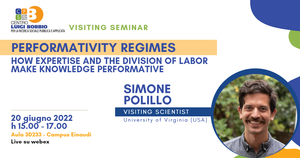20 giugno 2022 | Visiting Seminar: Simone Polillo

Performativity Regimes: How Expertise and the Division of Labor Make Knowledge Performative
Seminario con Simone Polillo, University of Virginia (USA), Sociology Department
Visiting Scientist Progetto Eccellenza
Organizzato da Dipartimento di Culture, Politica e Società - Centro Luigi Bobbio per la Ricerca Sociale e Applicata
20 Giugno 2022 ore 15.00
Torino, CLE, Sala seminari 3D233
Webex
Over the past three decades, performativity has emerged as a central program in the economic sociology of markets. Among its core insights is the idea that markets, and more generally the economy, are performed by economics: more specifically, economic knowledge does not simply describe its objects of analysis, rather it formats those objects, shapes them, and constitutes them as particular objects, opening them to certain kinds of interventions, and not others, and certain, subsequent analyses, and not others. Yet, whether performativity is a historical process, how it comes about, and what institutional conditions allow it to unfold, are issues that remain largely unexplored. In this paper, I suggest that economic knowledge is, to an extent, knowledge about a division of labor: who produces it, how it circulates, and how shared it is, are functions of features of the division of labor itself. In order to advance our understanding of the processes through which economies are constituted and formatted, I show the links between performativity and the division of labor and propose the notion of the “performativity regime” to tie these two aspects together. Performativity regimes vary in terms of how centralized or dispersed expert authority is (i.e. its position in a broader institutional structure and its networks), and how much control it exercises over devices and representations. I draw from a historical analysis of the elaboration of a macro-econometric model of the Italian economy by the Bank of Italy in the late 1960s, its initial failure and later success in giving scientific legitimacy to the Bank’s monetary policy, to show how shifting configurations of expert authority make performativity more or less felicitous.





